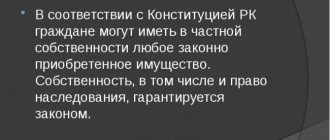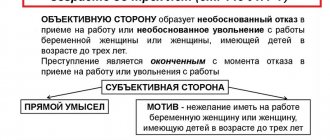History of immunity
The first ideas about prohibiting interference in personal life arose during the bourgeois revolution in Europe. Officially, such a right was enshrined in the laws of France; later, such a concept became international and was adopted in the USSR (“by inheritance” passing to Russia). An interesting fact is that in the United States there is virtually no such thing as privacy or personal property. Of course, something similar still exists, but it comes not from current legislation, but from judicial precedents. Every year these rights are gradually modernized to better suit changes in the world. In many countries around the world, home privacy laws, if they exist at all, play virtually no role. Government agencies, if necessary, can ignore this right, which is quite logical, especially when searching for dangerous criminals.
About Article 139 of the Criminal Code of the Russian Federation and crimes, composition and other features
Antisocial and quite dangerous behavior includes illegal entry into the territory of an apartment or house, or any other similar building, without the consent of the owners or legal tenants of the property. Such actions pose a threat to the rights and interests of citizens.
Such behavior is considered a crime, so there are several phenomena associated with it.
The subject for such an act is the premises itself, which legally belongs to the owner. And it has sufficient characteristics for living.
The definition of a dwelling does not include transport and waterfowl, other types of vehicles and objects that are not suitable for permanent residence.
Active behavior when entering other people's homes without the consent of other persons will be the subject of the phenomenon under consideration.
The presence of direct intent can be attributed to the subjective component. When classifying a crime itself, the motives and methods of penetration do not matter. Deception and abuse of someone's trust also do not play a role.
Offenses often involve threats to human life and safety. Due to such circumstances, the liability that a citizen may incur is aggravated.
Concept
Art. 25 of the Constitution of the Russian Federation “On the inviolability of the home” does not provide a clear definition of what is meant by such premises. However, such data is indicated in Federal Law No. 26. Thus, housing means a private house, with all the residential and non-residential premises included therein. Apartments also belong to this definition, in fact, like any other building in which you can live at least temporarily. Thus, the right to inviolability of the home applies to almost any premises. Exceptions may include non-residential buildings, but even then only in some cases.
It should be remembered that no place of residence, even intended for this purpose, but having the function of movement, receives protection from this law. For example, you can be held accountable for breaking into a private house or apartment, but not into a train compartment, a ship's cabin, a motor home, and so on. They all relate to vehicles and the rules there are regulated completely differently.
What it is
The concept of “inviolability of the home” means that the following actions cannot be performed with the home without the permission of the owner:
- Inspection.
- Searches.
- Seizure.
An exception is made only in situations that are expressly described in the law. The right is described in detail in Article 25 of the Constitution of the Russian Federation. The Housing and Criminal Procedure Code only specify some provisions related to this area.
housing as objects that meet several specific conditions:
- Private buildings with rooms inside that are intended for living or not.
- Apartments from the housing stock that are suitable for living.
- Objects for housing, but not belonging to the housing stock.
Attention! The concept includes various structures that are located next to development sites, but are not intended for permanent residence.
The same rule applies to barns, garages, cellars, and courtyard buildings. The following persons are entitled to immunity from buildings of this kind:
- Persons whose move-in took place without objections from the owners.
- Citizens with the right to use.
- Owners of residential premises.
What is home inviolability
The definition is quite simple. The law on the inviolability of the home implies the fact that no one has the right to enter the premises in any way unless there is permission from its owner or another person who has the right to live in it. Only in some cases can an exception be triggered if this is provided for by court decisions or certain provisions of federal laws. However, even such situations must be strictly regulated and documented within a specified time frame (they may change depending on the conditions that arise).
What to do in case of lawlessness?
In case of such violations, a citizen has the right to report it to law enforcement agencies. At the same time, he has the opportunity to claim compensation for the damage incurred. When filling out an application form to the police, you must indicate your full name, postal or email address and the nature of the appeal.
If at least one of the required details is missing in the application, it may be left without response.
Submission of an application is accompanied by the subsequent issuance of a document containing the date of submission of the application, the number of the police duty station, rank, position and full name of the officer who accepted the application. The document must also indicate the period within which the decision will be made. The law stipulates that this period should not exceed 10 days.
Illegal entry and security threat
If an attacker illegally enters someone else’s home against the will of the people living there or refuses to leave the premises at the request of the owners who previously invited him to this home, the latter have the right to the necessary self-defense. At the same time, they can cause harm to the attacker, which is all the more justified the more aggressively the violator of the inviolability of the home behaves and the greater the danger he creates for the life and health of the owners.
The proportionality of causing harm to the offender to his actions is regulated by Art. 38 of the Criminal Code of the Russian Federation. The state of necessary defense must cease if the intruder has already left the premises or is unable to leave it due to his helpless state.
The inviolability of the home, enshrined in the Constitution of the country, is strictly protected by law. An infringement on the freedom and privacy of a person, which ultimately amounts to a violation of the inviolability of the home, is an act punishable by law. This is the guarantee of human civil rights by the state.
Punishment for violation
The right to inviolability of home also implies possible types of fines or other forms of penalties. If the entry occurred without the permission of the tenant/owner, without special aggravating conditions, then the punishment can be implemented both in monetary terms and in the form of forced labor or even arrest. Thus, a person who violates the inviolability of a home, for which another person is responsible, is obliged to pay an amount of up to 40,000 rubles. If the salary does not allow making such payments, then the total amount of payments may amount to payment for 3 months of the attacker’s work. Alternatively, punishment may be applied in the form of compulsory labor for 15 days, arrest for 3 months, or correctional labor for up to 1 year. But that's not all.
If the penetration occurred using threats or even violence, the fine increases significantly, up to 200,000 rubles (or payment for work for a period of 18 months). There is also an alternative - correctional or forced labor for 2 years, and another option is arrest for the same period.
Chapter 2. Rights and freedoms of man and citizenArticle 17
1. In the Russian Federation, the rights and freedoms of man and citizen are recognized and guaranteed in accordance with the generally recognized principles and norms of international law and in accordance with this Constitution.
2. Fundamental human rights and freedoms are inalienable and belong to everyone from birth.
3. The exercise of human and civil rights and freedoms should not violate the rights and freedoms of other persons.
Article 18
The rights and freedoms of man and citizen are directly applicable. They determine the meaning, content and application of laws, the activities of the legislative and executive powers, local self-government and are ensured by justice.
Article 19
1. Everyone is equal before the law and the court.
2. The state guarantees equality of rights and freedoms of man and citizen, regardless of gender, race, nationality, language, origin, property and official status, place of residence, attitude to religion, beliefs, membership in public associations, as well as other circumstances. Any form of restriction of the rights of citizens on the basis of social, racial, national, linguistic or religious affiliation is prohibited.
3. Men and women have equal rights and freedoms and equal opportunities for their implementation.
Article 20
1. Everyone has the right to life.
2. Until its abolition, the death penalty may be established by federal law as an exceptional measure of punishment for especially serious crimes against life, providing the accused with the right to have his case heard by a court with the participation of a jury.
Article 21
1. Personal dignity is protected by the state. Nothing can be a reason to belittle him.
2. No one should be subjected to torture, violence, or other cruel or degrading treatment or punishment. No one can be subjected to medical, scientific or other experiments without voluntary consent.
Article 22
1. Everyone has the right to freedom and personal security.
2. Arrest, detention and detention are permitted only by court decision. Pending a court decision, a person cannot be detained for more than 48 hours.
Article 23
1. Everyone has the right to privacy, personal and family secrets, protection of their honor and good name.
2. Everyone has the right to privacy of correspondence, telephone conversations, postal, telegraph and other messages. Restriction of this right is permitted only on the basis of a court decision.
Article 24
1. Collection, storage, use and dissemination of information about the private life of a person without his consent is not permitted.
2. State authorities and local self-government bodies, their officials are obliged to provide everyone with the opportunity to familiarize themselves with documents and materials that directly affect their rights and freedoms, unless otherwise provided by law.
Article 25
Home is inviolable. No one has the right to enter a home against the will of the persons living there, except in cases established by federal law, or on the basis of a court decision.
Article 26
1. Everyone has the right to determine and indicate their nationality. No one can be forced to determine and indicate their nationality.
2. Everyone has the right to use their native language, to freely choose the language of communication, education, training and creativity.
Article 27
1. Everyone who is legally present on the territory of the Russian Federation has the right to move freely, choose their place of stay and residence.
2. Everyone can freely travel outside the Russian Federation. A citizen of the Russian Federation has the right to freely return to the Russian Federation.
Article 28
Everyone is guaranteed freedom of conscience, freedom of religion, including the right to profess, individually or together with others, any religion or not to profess any, to freely choose, have and disseminate religious and other beliefs and to act in accordance with them.
Article 29
1. Everyone is guaranteed freedom of thought and speech.
2. Propaganda or agitation that incite social, racial, national or religious hatred and enmity are not permitted. Promotion of social, racial, national, religious or linguistic superiority is prohibited.
3. No one can be forced to express or renounce their opinions and beliefs.
4. Everyone has the right to freely seek, receive, transmit, produce and disseminate information by any legal means. The list of information constituting a state secret is determined by federal law.
5. Freedom of the media is guaranteed. Censorship is prohibited.
Article 30
1. Everyone has the right to association, including the right to create trade unions to protect their interests. Freedom of activity of public associations is guaranteed.
2. No one can be forced to join or remain in any association.
Article 31
Citizens of the Russian Federation have the right to assemble peacefully, without weapons, to hold meetings, rallies and demonstrations, processions and picketing.
Article 32
1. Citizens of the Russian Federation have the right to participate in the management of state affairs, both directly and through their representatives.
2. Citizens of the Russian Federation have the right to elect and be elected to government bodies and local self-government bodies, as well as to participate in a referendum.
3. Citizens declared incompetent by a court, as well as those held in prison by a court sentence, do not have the right to elect or be elected.
4. Citizens of the Russian Federation have equal access to public service.
5. Citizens of the Russian Federation have the right to participate in the administration of justice.
Article 33
Citizens of the Russian Federation have the right to apply personally, as well as send individual and collective appeals to state bodies and local governments.
Article 34
1. Everyone has the right to freely use their abilities and property for entrepreneurial and other economic activities not prohibited by law.
2. Economic activities aimed at monopolization and unfair competition are not allowed.
Article 35
1. The right of private property is protected by law.
2. Everyone has the right to own property, own, use and dispose of it, both individually and jointly with other persons.
3. No one can be deprived of his property except by a court decision. Forced alienation of property for state needs can only be carried out subject to prior and equivalent compensation.
4. The right of inheritance is guaranteed.
Article 36
1. Citizens and their associations have the right to own land in private ownership.
2. Possession, use and disposal of land and other natural resources are carried out by their owners freely, if this does not cause damage to the environment and does not violate the rights and legitimate interests of other persons.
3. The conditions and procedure for using land are determined on the basis of federal law.
Article 37
1. Labor is free. Everyone has the right to freely use their ability to work, choose their type of activity and profession.
2. Forced labor is prohibited.
3. Everyone has the right to work in conditions that meet safety and hygiene requirements, to remuneration for work without any discrimination and not lower than the minimum wage established by federal law, as well as the right to protection from unemployment.
4. The right to individual and collective labor disputes is recognized using the methods for resolving them established by federal law, including the right to strike.
5. Everyone has the right to rest. A person working under an employment contract is guaranteed the length of working hours established by federal law, weekends and holidays, and paid annual leave.
Article 38
1. Motherhood and childhood, the family are under the protection of the state.
2. Caring for children and raising them is an equal right and responsibility of parents.
3. Able-bodied children who have reached the age of 18 must take care of disabled parents.
Article 39
1. Everyone is guaranteed social security by age, in case of illness, disability, loss of a breadwinner, for raising children and in other cases established by law.
2. State pensions and social benefits are established by law.
3. Voluntary social insurance, the creation of additional forms of social security and charity are encouraged.
Article 40
1. Everyone has the right to housing. No one can be arbitrarily deprived of their home.
2. State authorities and local self-government bodies encourage housing construction and create conditions for the exercise of the right to housing.
3. Low-income people and other citizens specified in the law who need housing are provided with it free of charge or for an affordable fee from state, municipal and other housing funds in accordance with the norms established by law.
Article 41
1. Everyone has the right to health care and medical care. Medical care in state and municipal health care institutions is provided to citizens free of charge at the expense of the corresponding budget, insurance premiums, and other revenues.
2. In the Russian Federation, federal programs for the protection and promotion of public health are financed, measures are taken to develop state, municipal, and private health care systems, activities that promote human health, the development of physical culture and sports, environmental and sanitary-epidemiological well-being are encouraged.
3. Concealment by officials of facts and circumstances that pose a threat to the life and health of people entails liability in accordance with federal law.
Article 42
Everyone has the right to a favorable environment, reliable information about its condition and to compensation for damage caused to his health or property by environmental violations.
Article 43
1. Everyone has the right to education.
2. General accessibility and freeness of preschool, basic general and secondary vocational education in state or municipal educational institutions and enterprises are guaranteed.
3. Everyone has the right to receive higher education free of charge on a competitive basis at a state or municipal educational institution and enterprise.
4. Basic general education is mandatory. Parents or persons replacing them ensure that their children receive basic general education.
5. The Russian Federation sets federal state educational standards and supports various forms of education and self-education.
Article 44
1. Everyone is guaranteed freedom of literary, artistic, scientific, technical and other types of creativity and teaching. Intellectual property is protected by law.
2. Everyone has the right to participate in cultural life and use cultural institutions, to have access to cultural values.
3. Everyone is obliged to take care of the preservation of historical and cultural heritage, to protect historical and cultural monuments.
Article 45
1. State protection of human and civil rights and freedoms in the Russian Federation is guaranteed.
2. Everyone has the right to protect their rights and freedoms by all means not prohibited by law.
Article 46
1. Everyone is guaranteed judicial protection of his rights and freedoms.
2. Decisions and actions (or inaction) of state authorities, local governments, public associations and officials may be appealed to the court.
3. Everyone has the right, in accordance with international treaties of the Russian Federation, to apply to interstate bodies for the protection of human rights and freedoms if all available domestic remedies have been exhausted.
Article 47
1. No one can be deprived of the right to have his case considered in the court and by the judge to whose jurisdiction it is assigned by law.
2. A person accused of committing a crime has the right to have his case examined by a court with the participation of a jury in cases provided for by federal law.
Article 48
1. Everyone is guaranteed the right to receive qualified legal assistance. In cases provided for by law, legal assistance is provided free of charge.
2. Every person detained, taken into custody, or accused of committing a crime has the right to have the assistance of a lawyer (defender) from the moment of detention, detention, or presentation of charges, respectively.
Article 49
1. Everyone accused of committing a crime is considered innocent until his guilt is proven in the manner prescribed by federal law and established by a court verdict that has entered into legal force.
2. The accused is not required to prove his innocence.
3. Irremovable doubts about a person’s guilt are interpreted in favor of the accused.
Article 50
1. No one can be convicted twice for the same crime.
2. In the administration of justice, the use of evidence obtained in violation of federal law is not permitted.
3. Everyone convicted of a crime has the right to have the sentence reviewed by a higher court in the manner prescribed by federal law, as well as the right to ask for pardon or commutation of punishment.
Possible exceptions to the general rule
Article 139 of the Criminal Code of the Russian Federation does not cover issues regarding the conditions under which penetration can still occur. But Art. already speaks about this. 25 of the Constitution of the Russian Federation. There is a clear reference to the Law “On Police”, implying the possibility of entry of law enforcement officers in the following situations:
- If necessary, establish the circumstances of the accident.
- When it is necessary to stop a crime in progress.
- In the event that there is a need to detain persons potentially guilty of crimes.
- To ensure an adequate level of safety for any citizens, public, in case of emergency or riots.
Every time there is a need to take advantage of the above opportunities, the owner and/or residents of the premises where the penetration occurred must be notified no later than 24 hours. Of course, provided that they were not there at that moment. In any case, it is important to have a special court decision, without which the police officer has no right to carry out such actions. The only option when even this is not required is to make a decision if necessary and correct the situation right now. In this case, the court must be notified no later than 24 hours from the moment of the incident. For example, a police officer sees a potential suicide.
If he has such an opportunity, then he has the right to enter his home and prevent a suicide attempt. Also, if a group of criminals, pursued by law enforcement agencies, seizes a residential premises, the police have every right to immediately begin the assault, without waiting for the permission of the owners or a court decision. Of course, if such urgency is really advisable.
Protection of rights
Citizens have the right not to allow unauthorized persons into the territory of real estate that belongs to them. It is necessary to contact the police with statements if a person enters who did not have any legal rights to do so.
The application must include the following information:
- Full name along with the position of the head, supplemented by the name of the recipient institution.
- Full name of the applicant, supplemented by a contact phone number.
- Description of the circumstances under which the inviolability of housing was violated.
- Demand to be held accountable.
- A date and signature are required.
At the police department they hand over an application slip, accept documents and confirm their consent to their processing. The question has been repeatedly raised that it would be possible to expand the right of citizens to the protection of housing. But this problem remains under consideration.
There is also civil law protection of personal integrity. This is the name of a whole range of measures related to the protection of citizens.
Service status and punishment
If a police officer nevertheless used his status and illegally entered the premises, he will also be fined. The law on the inviolability of the home implies punishment in the form of an amount of up to 300,000 rubles (or wages for 2 years). As in all other cases, there are alternative measures:
- Imprisonment for 3 years.
- Arrest for 4 months.
- Forced labor for 3 years.
- Prohibition to hold office for up to 5 years.
Thus, even police officers cannot take advantage of their official position, and if they decide to do so, the punishment will be quite significant.
What laws regulate the right to security of housing?
The Constitution in this direction is considered the main document. But there are also additional acts where many provisions are clarified and supplemented:
- Article 3 of the Housing Code.
- Article 5 of the Criminal Procedure Code.
- Article 139 of the Criminal Code.
There are also documents at the international level that provide sufficient information in this direction:
- European Convention for the Protection of Human Rights and Fundamental Freedoms.
- International Covenant on Civil and Political Rights.
- Universal Declaration of Human Rights.
Subject
According to the existing principle of inviolability of the home, any individual is considered a violator, provided that he is sane and has reached the age of 16 years. It must be well aware of the essence of the actions being taken, as well as the fact that they are illegal and may ultimately lead to punishment. This is especially applicable to situations involving violence or the threat of its use, not to mention the use of official position.
In the event that the culprit really turns out to be an inadequate person who is simply unable to take responsibility for his actions and at the same time absolutely does not understand the essence of the problem, leniency may be shown to him. The fine will be reduced, as will the alternative sentences. Some criminals try to take advantage of this feature and pretend to be inadequate, but medicine is quite capable of giving a truly correct diagnosis. So even if a really sick citizen, not understanding what exactly he is doing, does work for the benefit of a criminal group, they will still receive the full punishment. But their “tool” will most likely get off with a light fine.
Composition of the crime and criminal legal characteristics
The main object of this criminal attack is the constitutional right of a citizen to the inviolability of his home. Accordingly, the objective side of this criminal act is manifested in unauthorized entry into housing, committed against the will of the people living in it.
The subject of this criminal act is a sane individual who is 16 years old at the time of its commission. In Part 3 of Art. 139 of the Criminal Code of the Russian Federation refers to a special subject who uses his official position for unauthorized intrusion into a home. The subjective side of the crime under discussion includes guilt, manifested in the form of direct intent.
Victim
The right to inviolability of home, which is defined by Article 139 of the Criminal Code of the Russian Federation, implies the presence of an injured party. This is the victim. He is characterized as a person who has received the right to use (or own) the premises. This does not have to be the owner, because the same applies to renting citizens, regardless of which document gives such a right. In addition, by default, the injured party is considered to be absolutely everyone who was present at the time of penetration, people both permanently living there and those who got there with the permission or knowledge of the owners/tenants, provided that the attackers used threats or violence.
When can an article of the Criminal Code of the Russian Federation be violated?
In Part 1 of Art. 139 of the Criminal Code of the Russian Federation, the crime under discussion is characterized as a dangerous intentional act , aimed at unauthorized entry into housing against the will of the citizens living in it.
Its social danger lies in an attack on the private rights and freedoms of a person, in the process of which damage to the physical health of a citizen and his physical freedom may be caused. This crime undermines a person’s constitutional right to the inviolability of his home.
In the total mass of registered offenses and their punishability in the Russian Federation, the crime under discussion takes up 0.13% and 0.82%, respectively.
Penetration method
Everyone has the right to privacy - the inviolability of their home. And it doesn’t matter how it was broken, how the criminal got inside. This can be as simple as entering through a door with threats or violence, or secretly entering through a window or any other openings. The concept of inviolability of the home covers the entire range of possible actions of intruders, based not on the method, but on the actual result, based on which punishment will be applied.
Thus, a criminal can enter an apartment through a door, break down a wall or break a window, but in all cases this will be classified as trespassing. The law does not specifically indicate all options for possible entry into the premises, since it is impossible to take into account absolutely everything. And it's not necessary.
Inadmissibility of arbitrary deprivation of housing
The inviolability of home and the inadmissibility of its arbitrary deprivation are declared in Article 40 of the Constitution of the Russian Federation in the section on the rights and freedoms of citizens. And as one of the mandatory constitutional norms guaranteeing the rights of citizens, it is spelled out and specified in Article 3 of the Housing Code of the Russian Federation. According to this regulatory document, it is not allowed to illegally evict citizens from occupied residential premises or restrict their rights to use housing. If representatives of government bodies or citizens try to evict someone from legally occupied residential premises, then these actions can be considered illegal and appealed through judicial review.
The definition of deprivation of housing also includes actions to limit or deprive a person of the right to use it.
Legally, a citizen may be deprived of housing in the form of termination of a tenancy agreement for a number of violations of the rules for its use, including:
- improper use of the premises;
- violation of hostel rules;
- unauthorized construction;
- illegal entry.
Forced eviction is possible when a house is demolished or declared unsafe and subject to major repairs or reconstruction.
The inviolability of the home is a legal and constitutional norm, the violation of which is considered as a restriction of human rights and freedoms.
Author of the article
Violence or threats
A criminal will receive the maximum sentence or maximum fine if he not only deliberately tries to enter the premises, but does so by intimidating or causing bodily harm to the occupants. The principle of inviolability of the home directly links the scale of damage caused and responsibility for it. Thus, violence is qualified as direct influence on the victim, striking or other types of damage. Threats, in turn, are intimidation of the victim. They can be expressed either verbally or simply as swings that can make it clear that an injury is about to occur. It should be remembered that in addition to liability for breaking into a home, the person who caused the injury also violates Art. 111, 112 and 119 of the Criminal Code of the Russian Federation, thereby only worsening their situation.
What powers do federal agencies have?
In order to protect the rights of citizens and maintain public order, representatives of federal authorities have the right to enter premises without the permission of residents, but only under the following conditions:
- to stop the commission of a criminal act;
- in order to destroy threats to the safety of the population, government facilities and other property;
- during the pursuit of suspects in committing a criminal act, if delay poses a danger;
- under other circumstances prescribed by federal law.
An important point is that if entry into a home without the permission of the resident occurs, the responsible employee of the government department is obliged to notify the prosecutor’s office about the incident within 24 hours.
As for the inspection of housing, this action can be carried out only with the consent of the citizens living in it and on the basis of a decision of a judicial authority, with the exception of cases prescribed in federal legislative acts.
Only in exceptional cases, when there is no time to obtain a court order, a search can be carried out on the basis of an order by the investigator.
Conclusion
Based on everything said above, certain conclusions can be drawn. And the first of them is that the constitutional right to inviolability of home in our country is thought out quite well. On the one hand, ordinary citizens are protected both from criminals and the arbitrariness of law enforcement agencies. On the other hand, the police still have the opportunity to ignore such rules under very reasonable conditions aimed at stabilizing the situation, searching for criminals, stopping possible problems, saving lives, and so on. Only a few countries can boast of this.
Examples of rights violations
Let's take a few examples to consider when important violations were committed.
- When a citizen became completely drunk and was looking for a place to sleep. Such a person tore off the lock on a residential building, after which he settled comfortably on the existing territory. The residents called the police when they returned. As a result, six months of correctional labor were imposed as punishment.
- One person first breaks a window in a private house, and then opens the door for a friend to let the latter in. The consequences are obvious - the court ordered correction work to take 240 hours.
Reference! Most often, it is easier to immediately prevent atrocities than to try to correct something and restore justice later. After all, it also happens that the perpetrators are not found at all. Security systems and video surveillance solutions help cope with problems.
Other features of entering someone else's home
As is clear from what is described above, punishment is not required in every case of entry into someone else’s territory. If the premises are located at a great distance from the house, it cannot be used as housing - then the object will be deprived of its corresponding status. Trespassing is illegal only when such buildings are tightly combined with a residential building.
There are several types of penetrations into someone else's property:
- Gross intrusions.
- When residents open the doors.
- Refusal to open when inside.
- Explicit.
- Secret.
Every year there are more and more crimes and proceedings related to the facts of penetration into someone else's home. It often happens that the violators themselves do not realize the illegality of their actions. For example, if this happens during domestic quarrels. Or when the person himself suffers from a state of passion, alcohol intoxication.






